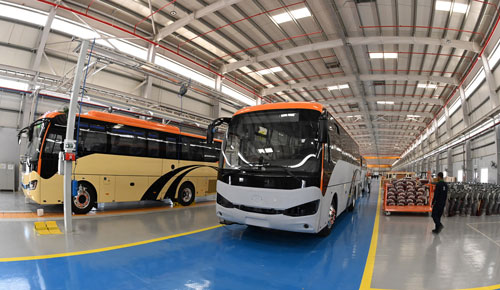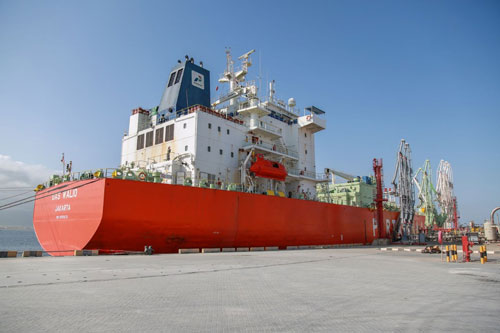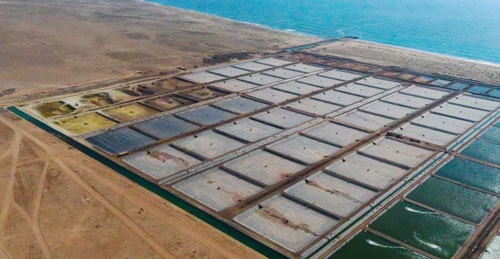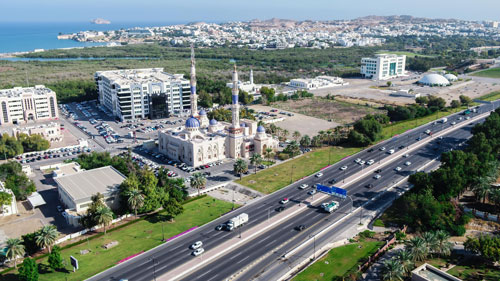Since formally assuming office on 11 January 2020, at a joint session of the Oman and Defence Councils, as prescribed by Article 7 of the Basic Law of the State, His Majesty Sultan Haitham bin Tarik has been marshalling national energies in the service of a renewed Omani renaissance. As the infrastructure of Oman Vision 2040 is established, layer by layer, the goals of the renewed renaissance are merging with that vision. Oman 2040 was launched at the start of 2021, alongside the Tenth Five[1]Year Plan (2021-2025).

Together these three strategic and mutually supportive projects can be seen to come together in the sweeping vision of His Majesty Sultan Haitham. In an early and ground[1]breaking address, delivered on 23 February 2020, the far-reaching extent of that vision were made clear in his pledge to overhaul the state’s administrative apparatus , broaden the access of young people by expanding opportunities for their contribution to the development efforts.

Women could expect greater empowerment, and a more prominent position in the action and consequences of the changes to be brought in by Oman Vision 2040. Supporting these major shifts would be a legislative infrastructure that would see through the reforms into a future of sustainable and comprehensive development.
His Majesty has already seen through to reality many of these ambitious pledges, fully committed as he is to sustaining the momentum of the renewed renaissance through the next phase of the national plan, while preserving the accomplished phases of that plan. The endeavour is one that demands engagement by the public, who will benefit from its successes, harvesting the rewards of progress manifested in their beloved country in a climate of territorial security and social stability.
Sultan Haitham has taken a direct interest in the rollout of Oman Vision 2040, which will consume four five-year development plans on the path to its full fruition. The first of these, launched in January 2021, outlined ambitious national goals, linked directly to specific executive projects set within strict time frames. They are projects intended to restore the momentum of economic growth and achieve balanced economic and social objectives.
His Majesty has carefully vetted these initiatives, examined their structure, measured their feasibility within the stated time schedules and will monitor their implementation as they are set in motion, adapting them to emerging realities as necessary. Oman Vision 2040 revolves on four main axes. The ‘creative human society’ envisioned will value and enhance education, learning, scientific research, national capabilities, health, citizenship, identity, heritage, national culture, welfare, social protection and youth development.

The ‘economy in a competitive ethos’ incorporates concepts of economic leadership, management and diversification, financial sustainability, the labour market, employment, the private sector, investment, international cooperation, development within the governorates, sustainable cities, and information technology. The third axis, the ‘environment of sustainable resources’ concerns itself with aspects of the environment, with its natural resources; and the fourth axis, the ‘state of responsible institutions,’ covers matters related to legislation, the judiciary, control and governance within the state’s administrative apparatus, resources and projects.
All four axes are consistent with the strategic direction that is taking the Sultanate to a place where its citizens can be proud of their identity and culture, and committed to their homeland. In demonstrating the seriousness of his intent to secure the future of Oman’s great project, its well-grounded domestic ambitions as well as the protection of its local, regional and international standing, His Majesty Sultan Haitham initiated a radical examination of every component of the state infrastructure, including its very constitution.

The exercise resulted in reforms that brought new clarity to the underlying principles of the half[1]century old renaissance, principles that define the social and cultural ethos of the Sultanate itself and its message to the world beyond: a striving for justice, truth, security, stability and peace within and among communities at home and abroad, and a determination to continue efforts to shape a better future.
The Basic Law of the State was promulgated by means of Royal Decree No 6/2021, to be a cornerstone of the continuing effort, to lock in the structure of the renewed renaissance and expand its forward horizon. The Basic Law consists of 98 articles that are collectively supportive of the state’s institutions, protective of the homeland, of its territory, its unity, and its social fabric. It stands for the nation’s evolved culture, enhances the rights, duties and freedoms of its citizens. It establishes a stable mechanism for the transfer of government, providing a reassurance which will be positively reflected in many sectors of national activity, notably those of a political and economic nature. It affirms the principle of the rule of law and the independence of the judiciary as bases for governance in the state.
It mandates education ‘’up to the end of the basic education phase”, and advocates for “the implanting of the scientific method in thinking, and the development of intrinsic gifts.” It encourages innovation, a component indispensable to the vision of Oman 2040. To cement into place the pillars of the renewed renaissance and allocate to best effect its individual projects to the parties who will be responsible for implementing them required a reassessment of performance, of competencies, and of the legislation that underpins public authority.
The latter was examined, and adjusted as necessary for greater efficiency or transparency. Oman Vision 2040 envisages a transformed landscape of smart and sustainable cities across the Sultanate, cities characterised by social justice, and social and economic prosperity, where economic growth is paralleled by social welfare; where flexible and responsible state organs enjoy governance with effective oversight. The reorganisation of the state’s administrative apparatus, announced on 18 August 2020, was accompanied by a review of certain ministerial portfolios, which were as a consequence abolished, expanded, renamed or merged. Several specialist councils and entities were dismantled, others created.
The Council of Ministers was itself restructured as part of the overhaul of the state administration to better align with the demands of the upcoming phase and better guarantee the anticipated rewards of development. The general budget for 2021 focused on securing the sustainability of basic social services and maintaining a level of expenditure in the provision of these services of no less than 40% of allocations.
His Majesty Sultan Haitham, presiding over a cabinet meeting in December 2020, noted that he had followed with close interest the incremental preparatory phases that led up to announcement of the Tenth Five-Year Development Plan (2021-2025) and the state’s general budget for the fiscal year 2021. These combined strategic acts of government represented the initial steps along the path to Oman Vision 2040. They were drafted with reference to the financial circumstances which the Sultanate was and is undergoing, where focus must be on ensuring financial sustainability by a process of increasing revenue and rationalising spending.
His Majesty approved the recommendations proposed as a result, which included the establishment of two retirement funds, the first for the benefit of the civil and private sector, and the second for members of the military and security services. The minimum service requirement for qualification for early retirement in all applicable systems was set at 30 years. Meanwhile, a harmonised retirement system for all new employees in government departments and the private sector was created, with retroactive effect on employees who had completed fewer than ten years of the mandated period for entitlement to the retirement pension.
Sultan Haitham has frequently expressed his preoccupation with the outlook for young people, for creating a future that can offer them the fulfilling lives and rewarding employment opportunities they deserve. He is uncompromising in his commitment to this ideal, and to ensuring that they participate actively in its achievement. The younger generations are, in his words, “the inexhaustible wealth and resource of nations, the human engine that builds the nation’s present and its future.”
His Majesty returned to this theme in his address to the Council of Ministers on 10 December 2021, emphasising the importance of maintaining open channels of communication with young people, to make clear to them the endeavour to keep the development process on track, to hear their voice and know their dreams. He has instructed the creation of qualified panels to address their concerns through a schedule of recurrent meetings with this intent, where they may introduce matters of particular interest to them, where their views may be heard and respected, and where a uniquely young perspective can be added to the process of building, with their assistance, the nation which they and future generations will inherit.
As a reflection of His Majesty’s concern for the younger generation, and in exercise of his focus on employment as being at the heart of this concern and the need for new departures in this area, a pioneering set of initiatives was launched in May 2021 in the shadow of the contracting global economy.
The repercussions of major global shifts have led to a downturn in the labour market, both domestically and elsewhere, and this has been compounded by the impact of the Covid-19 pandemic. The initiatives were designed to provide upwards of 32,000 job opportunities in 2021, including 12,000 jobs in the civil and military governance sectors, allocated in line with their respective needs.
His Majesty presided over a meeting of the Supervisory Committee of the National Employment Programme on 5 July 2021, where he accented the urgency of the youth employment pillar. He urged all public and private sector employers to cooperate in finding solutions to the labour dilemma, to expedite valuable research of relevance to the matter, to confront challenges head on with practical strategies to employ young Omani job seekers in all market sectors.
Jobs must, he stressed, be sustainable, adequate, worthwhile. They should be compatible with the vision of Oman 2040. He pledged his continued close support and patronage to ensure that these initiatives were taken seriously and brought to fruition.
The National Employment Programme was introduced by His Majesty during a meeting of the Council of Ministers over which he presided on 15 June 2021, and constitutes one of the most important national programmes emanating from the Oman 2040 vision. It seeks out sustainable solutions to job provision in all sectors of state and private sectors, using data analysis to identify unemployment blocks in certain sectors, to bridge knowledge and skill gaps with a view to facilitating entry to the job market, and to do so in a structured manner that monitors performance and outcomes.
Education is key to the success of this process, ensuring that job applicants are properly prepared to enter a competitive labour environment. The system is fully supportive of this objective, promoting empowerment as an aspiration in education and across the workforce. His Majesty announced on 1 November 2020 that the Diwan of the Royal Court would be financing the construction of six priority schools during the coming phase, at an estimated aggregate cost of around RO8.85 million.
Sultan Haitham is strongly supportive of a decentralised approach to development and is anxious to ensure a fair allocation of development projects and services across the governorates. The government shares this approach, as represented for instance in the vast network of publicly financed roads that crisscross the Sultanate and extend to its farthest corners.
On 4 February 2021, His Majesty gave the go ahead to the Dibba-Lima-Khasab road project and urged the concerned authorities to seek such alternative means as can expedite the completion of this road, given the urgent need for its construction. The road will link villages and wilayat within the Governorate of Musandam, facilitating mobility and a smooth flow of traffic for residents and visitors, as well as serving the purposes of much needed and beneficial economic growth in the area and in the Sultanate as a whole. The rapid transition to e-government continues to advance. His Majesty, presiding over the Council of Ministers meeting of 15 December 2020, pledged an undertaking to follow up on the efforts made by the government in this field, with emphasis on accelerated rollout of all services that improve the lives of citizens and residents, businesses and investment interests.
These enhancements are key to the health of the economic and development sectors. His Majesty directed that implementation of the unified national portal for e-government services be expedited, to become a unified platform for the delivery of government services. At a recent Council of Ministers meeting over which he presided on 9 November 2021, His Majesty underlined the necessity for all state institutions to re-engage their efforts to advance government e-services, to continue implementation of digital transformation initiatives, find comprehensive solutions to challenges, and to use all available energies and resources to this end.
A dynamic approach is necessary if government strategy is to keep pace with current and future circumstances, and maintain clear communication and interaction with the community and its aspirations. In order to achieve better performance and better service levels that keep pace with developments and further the public interest, His Majesty announced that an independent unit will be established under his oversight to measure performance within government institutions on a continuous assessment basis. The outcomes would be used to suggest mechanisms for greater efficiency, measured by consumer satisfaction ratings.
The Sultan directed that a decision-making support unit be affiliated to the Secretariat-General of the Council of Ministers that would have the task of elevating performance by way of more efficient decision-making protocols. His Majesty has directed much of his attention to employment practices within the public sector. He has advocated for higher efficiency levels within the units of the state administrative apparatus, urging public sector employees to engage with the urgency of external realities and incoming trends. His Majesty gave directions for the promotion of government employees attached to the civil service system and who were eligible for seniority in 2011, to take effect as and from 2022.
In lockstep with the government’s social and economic initiatives and state-supported services to citizens, Sultan Haitham directed that the price of vehicle fuel be fixed with the October 2021 average as a maximum, with the government subsidising any upward differentials that might arise from fluctuating oil prices. The fuel support would remain in place up to the end of 2022. His Majesty cancelled a package of charges associated with specific sector activities and reduced others, all with a view to stimulating economic activity and revitalising the investment environment generally.










